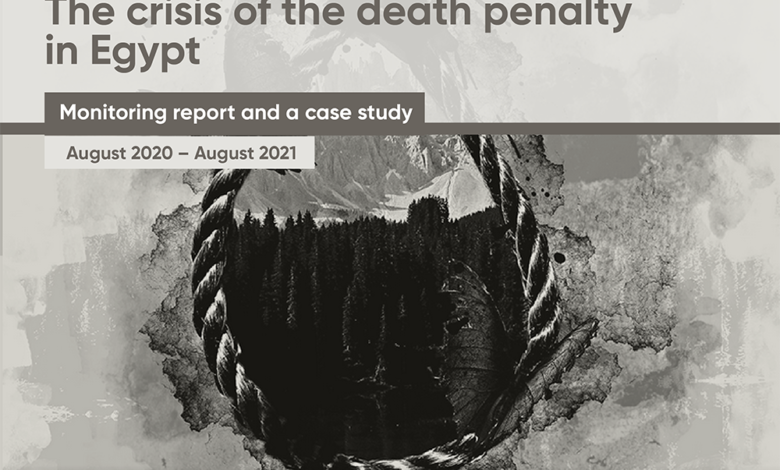
This report deals with the death penalty in Egypt in detail through four main axes. The first axis relates to the compilation and analysis of data on death sentences issued by criminal departments of different legal jurisdictions (judgments of criminal courts), the judgments supported by the Court of Cassation, and finally the death sentences that were carried out on those convicted with this cruel punishment, and this axis is limited to the time period from August 2020 to August 2021.
The second axis of the report discusses some of the legal problems that raise a wide legal controversy in terms of application and practice, given that these problems are subject to the interpretations of the Criminal Court of Cassation and criminal law jurists, and there are no legal texts regulating the objective way of dealing with them. These problems affect the integrity of the procedural and substantive rules in the cases, in which death sentences are issued and represent a violation of the guarantees of fair and equitable trials. They relate to the role of the criminal judge in dealing with the following legal issues: evidence of judicial recognition, witness testimony, security investigations, forensic evidence(s) obtained as a result of torture in both its aspects, violation of the right to defense, and finally a simplified summary of the limits of authority of the discretion of the criminal court judges, in order to determine the extent to which these problems relate to the legal reality. In this axis, the report deals in all its details with a case study of the monks of the Abu Makar Monastery, which is the case known in the media by the killing of the deceased Anba Epiphanius, Bishop and Head of the Anba Makari Monastery in Wadi al-Natrun.
As for the third axis of this report, it deals with three reasons why the criminal justice system continues to issue and carry out executions in the same manner. These reasons are the 2017 amendments to the Law on Cases and Procedures of Appeals in Cassation, the persistence of the emergency status, and the failure to form criminal appeals courts.
Finally, the fourth axis lists the recommendations that the Campaign to Stop the Death Penalty in Egypt concluded as a result of its legal and research work regarding the death penalty.
Finally, the fourth axis lists the recommendations that the Campaign to Stop the Death Penalty in Egypt concluded as a result of its legal and research work regarding the death penalty.
These recommendations are represented in three aspects.
The first is the general recommendations related to punishment, such as stopping its implementation, and the second are concerned with the development of some special legal texts regarding guarantees of a fair and just trial in cases of executions, such as excluding the evidence of judicial recognition from the evidence of criminal evidence in crimes punishable by death.
As for the last aspect of the report’s recommendations, it deals with recommendations related to the legislative environment of the criminal justice system in Egypt, which certainly affects death sentences, such as stopping the emergency law and the formation of appeal circuits for criminal court rulings.





